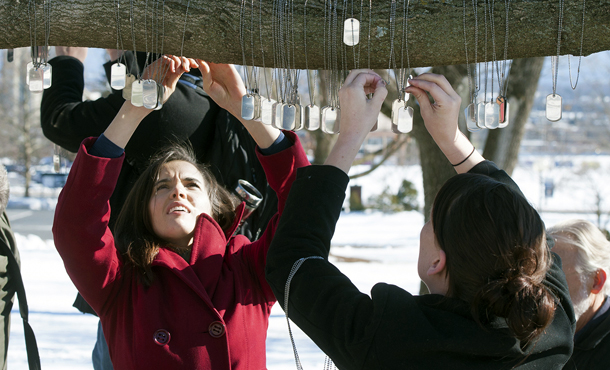A breeze rustled the blank silver tags hanging on the tree’s wiry branches, causing a soft jangling noise to ring in the ears of a group of silent onlookers.
Some closed their eyes and others gazed at the dog tags hanging from the maple tree at Eastern Mennonite University. The group was there for Thursday’s closing ceremony of a project known as the “Silent Witness.” Each oblong necklace dangling from the tree’s branches represented a veteran who took his or her own life.
“At first when we hung them up, there weren’t enough to chime,” project co-organizer Katrina Gehman, 25, said of the tags, which were added to the tree daily. “The more it grew throughout the month the more we would hear that music. Hearing the music, it’s like a beautiful representation [of their lives].”
As Gehman’s fellow organizer, Michael McAndrew, 28, says, the tags represent “a lot of people’s stories.”
Each day throughout November, McAndrew and Gehman, both graduate students in EMU’s Center for Justice and Peacebuilding, hung 22 tags on the tree. That’s the number of veteran suicides that occurred each day in 2010, according to a U.S. Department of Veterans Affairs study.
By the end of the month, 660 dog tags hung on the EMU tree.
“It’s a huge epidemic really [and] we just don’t think that people should be silent about it,” he said.
McAndrew, who served for four years in the Navy, came up with the idea for the project to raise awareness about the isolation, mental strife and other difficulties veterans can have as they try to ease back into civilian life upon returning from service.
He counts himself as “one of the lucky ones” — a member of the military who did not fight depression or face other barriers upon ending his service. McAndrew served in various foreign countries, but never in combat zones.
“I’ve known a lot of people who struggled with depression, PTSD, alcoholism [or] divorce,” he said. “Being [at EMU] and making the transition from a military environment to a peacebuilding environment made me want to practice what I was learning.”
Gehman was also interested in the issue, and invited McAndrew to join her in an EMU seminar called Journey Home from War. That seminar was specifically about veterans’ transitions back to civilian life. She then joined McAndrew on the project.
“It’s a symbolic way of saying, we as a community are acknowledging what they’ve gone through,” Gehman said. “The physical [and] moral injuries in their spirits; this project was just to make that visible because it’s invisible in a lot of ways in our society today.”
The duo also received help and support from local churches, fellow classmates and a nonprofit organization known as Veterans for Peace.
“I’m really grateful that so many people could come together with us to share their stories and just really honor the dignity of these men and women,” said McAndrew.
Courtesy Daily News Record, Dec. 16, 2013
